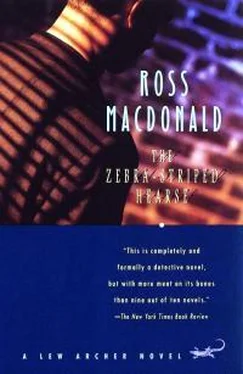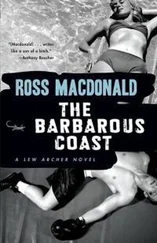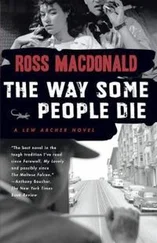“Then your husband died, and you moved away.”
“I’d already lost her by that time,” she said defensively. “It wasn’t I who failed Dolly. She’d begun to steal money from my purse and lie about it, and she did other things I prefer not to go into. She’s dead: nil nisi bonum .”
“I wish you would go into the other things.”
“I’ll put it this way. I wasn’t able to protect her against degrading influences – I only had a part of her life after all. She ran with the wrong crowd in high school and picked up gutter ideas of sex. Dolly was already mature at the age of fifteen.”
She didn’t go on. Her mouth was grave, her eyes watchful. It was possible, I thought, that Dolly had made a play for Ronald Jaimet before he died. It was possible that Jaimet had fallen for it. A daughterless man in middle age can take a sudden fall, all the way down to the bottom of the hole. It would be a suicidal hole, but suicide came easily to a diabetic. He simply had to forget his dose and his diet.
Being a murder victim came easily to a diabetic, too.
“You have that look again,” Isobel Blackwell said. “That objective look, as you call it. I hope I’m not the object of your thoughts.”
“In a way you are. I was thinking about Ronald Jaimet’s death.”
“Apparently you’ve come here tonight determined to spare me nothing. If you must know, Ronald died by accident. And incidentally, since I think I know what’s on your mind, Ronald’s relations with Dolly were pure – wonderfully pure. I knew Ronald.”
“I didn’t. What were the circumstances of his death? I understand Mark was with him.”
“They were on a pack trip in the Sierra. Ronald fell and broke his ankle. What was worse, he broke his insulin needle. By the time Mark got him down the hill to Bishop, he was in a coma. He died in the Bishop hospital, before I could get to him.”
“So you have the story from Mark.”
“It’s the truth. Ronald and Mark were good friends as well as cousins. Ronald was the younger of the two, and he’d always admired Mark. I could never have married Mark if that hadn’t been the case.”
Under the increase in pressure of my questions, she seemed to feel the need to justify the main actions of her life. I brought her back to Ronald Jaimet’s death.
“Diabetics don’t usually go on pack trips in the mountains. Aren’t they supposed to lead a fairly sheltered life?”
“Some of them do. Ronald couldn’t. I realize, I realized then, that it was risky for him to expose himself to accidents. But I couldn’t bring myself to try and stop him. His annual hike was important to him, as a man. And Mark was there to look after him.”
I sat for a minute and listened to the echoes of her last sentence. Perhaps she was hearing them, too.
“How did Ronald happen to take a spill?”
“He slipped and fell on a steep trail.” She jerked her head sideways as if to deflect the image of his fall. “Please don’t try to tell me that it was accident-proneness or unconscious suicide. I’ve been over all that in my mind many times. Ronald had a great sense of life, in spite of his illness. He was happy in his life. I made him happy.”
“I’m sure you did.”
She went on stubbornly, justifying her life and its meanings: “And please don’t try to tell me that Mark had anything to do with Ronald’s death. The two men were deeply fond of each other. Mark was like an older brother to Ronald. He carried him on his back for miles over rugged trails, back to the jeep. It took him most of a day and a night to bring him down the hill. When Harriet and I finally reached the hospital – she drove me up to Bishop that day – Mark was completely broken up. He blamed himself for not taking better care of Ronald. So you see, you’re wandering far afield when you suggest that Mark–”
“The suggestion came from you, Mrs. Blackwell.”
“No, it was you.”
“I’m sorry, but you brought it up.”
“I did?” She dragged her fingers diagonally across her face, pressing her eyes closed, drawing down one corner of her mouth. Her lipstick was smeared like blood there. “You’re probably right. I’m very tired, and confused. I only have about half a lobe working.”
“It’s the chloral hydrate,” I said, thinking that the drug had some of the properties of a truth serum.
“It’s partly that and partly other things. Before you arrived, I had a very wearing hour with Harriet’s mother. Pauline flew all the way from Guadalajara to find out what had happened. I didn’t know she had so much maternal feeling.”
“What went on in that hour?”
“Nothing, really. She seems to blame me for the family trouble, and I suppose I blame her. Someday, in the brave new world, we’ll all stop blaming each other.”
She tried to smile, and the faltering movement of her mouth charmed me. I would have preferred not to be charmed by her.
“Someday,” I said, “I can stop asking questions. As it stands, I have to go on asking them. What kind of a houseboy was Ralph Simpson?”
“Adequate, I suppose. He worked for us such a short time, it’s hard to say. I don’t like using servants, anyway, which is why we have only the one living in. I’m accustomed to doing things for myself.”
“Is that why Simpson was fired?”
“Mark thought he was too familiar. Mark likes to be treated as a superior being; Ralph Simpson was very democratic. I rather liked it. I’m not really used to the stuffy life.” She glanced up at the ancestors.
“I heard a rumor at Tahoe that Ralph was fired for stealing.”
“Stealing what, for heaven’s sake?”
“It may have been a topcoat,” I said carefully. “When Ralph got home from the lake, he had a man’s topcoat which he told his wife was given him. It was brown Harris tweed with woven brown leather buttons. One of the buttons was missing. Do you know anything about the coat?”
“No. Obviously you do.”
“Did your husband ever buy clothes in Toronto?”
“Not to my knowledge.”
“Has he ever been in Toronto?”
“Of course, many times. We passed through there on our honeymoon last fall.”
“This coat was bought from a Toronto firm named Cruttworth. Did your husband have dealings there?”
“I couldn’t say. Why is this topcoat so important to you?”
“I’ll tell you if you’ll let me look at your husband’s clothes.”
She shook her head. “I couldn’t possibly, without his permission.”
“When do you expect him back?”
“I don’t believe he’ll leave Tahoe until Harriet is found.”
“Then he may be there for a long time. The chances are better than even that she’s dead and buried like Ralph Simpson, or sunk in the lake.”
Her face was ugly with dismay. “You think Burke Damis did this to her?”
“He’s the leading suspect.”
“But it isn’t possible. He couldn’t have.”
“That’s his contention, too.”
“You’ve talked to him?”
“I ran him down last night. He’s in custody in Redwood City. I thought that was going to close the case, but it didn’t. The case keeps opening up, and taking in more people and more territory. The connections between the people keep multiplying. Damis’s real name is Campion, as you may know, and he married Dolly Stone last September. She had a child in March, and two months later she was strangled. Campion was the main suspect in her death.”
“That’s incredible.”
“What I find hard to believe, Mrs. Blackwell, is that you were totally unaware of all this.”
“But I was. I hadn’t been in touch with Dolly.”
“There has to be a further connection, though. You see that. Bruce Campion alias Burke Damis married your one-time foster daughter last year. This year he planned to marry your stepdaughter, with your support, and got as far as eloping with her. Coincidences come large sometimes, but I’m not buying that one.”
Читать дальше












